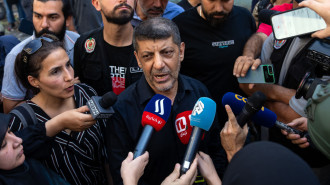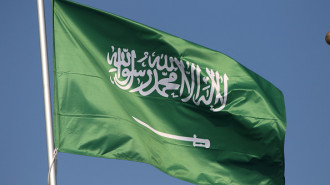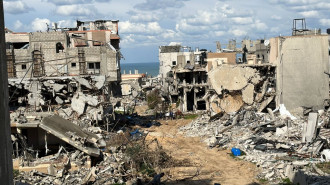Shia cleric Muqtada al-Sadr urges closure of US embassy in Baghdad to support Gaza
Prominent Shia cleric and leader of the Sadr Movement in Iraq, Muqtada al-Sadr called for the closure of the US embassy in Baghdad on Friday, 27 October, in a boost of support to the people of Palestine and Gaza Strip, which is facing a "genocide by the Israeli army".
Israel's devastating war against Gaza has killed at least 8,005 Palestinians, including 3,324 children, the besieged enclave's health ministry has said.
Early on 7 October 2023, Hamas launched a multifaceted surprise attack that killed around 1,400 Israelis, both soldiers and civilians, wounded hundreds, and saw around 200 people captured and taken to Gaza.
Sadr, who has a wide popular grassroots across Iraq, on Friday, urged the Iraqi parliament and Prime Minister Mohammed Shia al-Sudani's cabinet to vote on shutting down the US embassy in Baghdad as an act of support for the Palestinian people "because the US is supporting the Zionist regime by all means."
Muqtada Al Sadr, an Influential Iraqi Shia Muslim cleric, politician, and militia leader, asks for a Vote on the Closure of the U.S. Embassy in Iraq pic.twitter.com/sDQjyowD4k
— DEFCONTV (@DEFCONNEWSTV) October 27, 2023
Sadr, in a post on X, previously known as Twitter, also asked that the US diplomatic personnel be protected from any harm from "aggressive militias that seek to undermine Iraq's security and safety."
He also said that the Iraqi government should not reject his demand on the pretext that Iraq's income from selling oil is in the hands of the US Federal Reserve.
He cautioned that the current silence by the Iraqi government would lead to normalisation with Israel, poverty and injustice.
"We are waiting for the government's response and its action in response to this demand," Sadr added. "If the government and parliament do not respond, we will have another position to announce later."
The Iraqi parliament and government have yet to have any formal statements regarding Sadr's request.
Many Iraqi commentators predict that Sadr's call will be rejected, and consequently, he might ask his supporters to storm Baghdad's fortified Green Zone, which houses the headquarters of the Iraqi government, the US embassy and other foreign diplomatic missions.
In the context of Iraqi security, several Iran-backed Iraqi militias have shunned warnings by the Iraqi prime minister to cease attacks on military bases hosting US and international coalition military advisers.
The US military struck two facilities in eastern Syria used by Iran's Islamic Revolutionary Guard Corps (IRGC) and affiliated groups, Defence Secretary Lloyd Austin said on Thursday, 26 October.
Muqtada al-Sadr's political influence surged after winning a significant majority with 73 seats in the early elections held on 10 October 2021. He initially pledged to form a "national majority" government in collaboration with Sunni and Kurdish blocs, signaling a rift with other pro-Iran Shia blocs.
However, Sadr subsequently ordered his bloc's lawmakers to resign, which they complied with on 12 June. He declared a one-year hiatus from politics, during which he vowed to enact reforms through religious teachings and service to the faith.
In response, the "Coordination Framework" political bloc assumed the vacant seats, becoming the largest bloc in the Iraqi parliament. Mohamed Shia al-Sudani was elected as Iraq's prime minister, pledging to organise early general elections within a year.
Nonetheless, he recently indicated readiness to hold early elections if the parliament chooses to dissolve itself.
The Iraqi dinar dropped to at least 1,470 dinars against the dollar before the New York Federal Reserve introduced tighter controls on international dollar transactions by commercial Iraqi banks in November.
The move by the Federal Reserve was designed to stop the illegal siphoning of dollars to Iran.







 Follow the Middle East's top stories in English at The New Arab on Google News
Follow the Middle East's top stories in English at The New Arab on Google News


